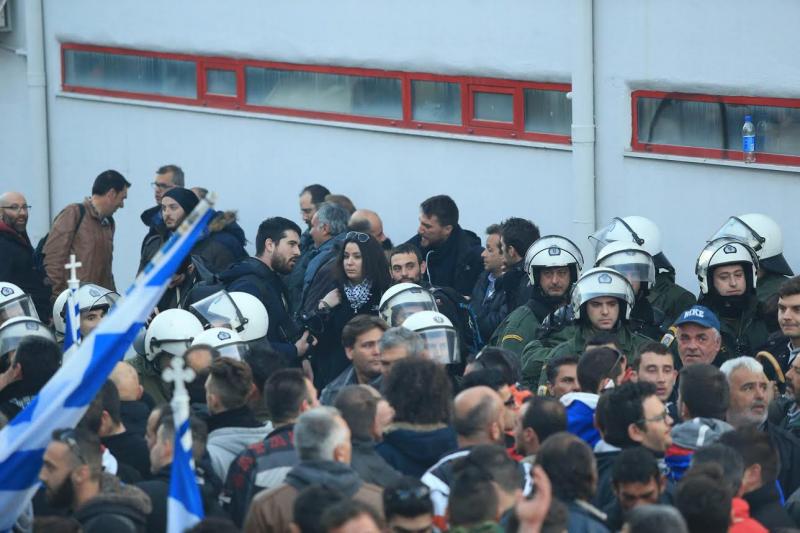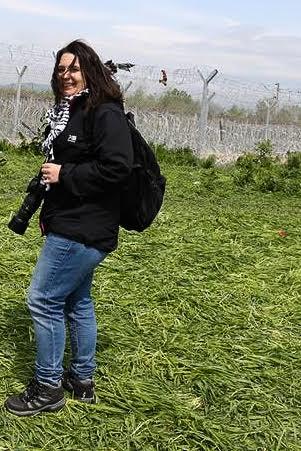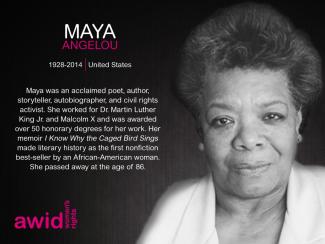Sin límites ni barreras
«No dejen de pelear porque la lucha no ha terminado: recién empieza.» – Marianna Karakoulaki
Desde el verano (boreal) de 2015, Idomenei, un pueblo ubicado en la frontera entre Grecia y Macedonia, albergó el campamento no oficial de personas refugiadas más grande de Grecia. A fines de mayo de 2016, las autoridades lo cerraron. Desde hace ya un año, Marianna Karakoulaki, una joven originaria de otra ciudad pequeña pero en el noroeste del país, ha venido cubriendo la crisis de las personas refugiadas en Idomenei como periodista independiente.

Marianna también ha cubierto protestas y levantamientos sociales, en particular desde Thessaloniki donde vivió durante los últimos años. Es corresponsal de varios medios como Deutsche Welle (DW), IRIN News, y Middle East Eye. Además, produce informes para la televisión y recientemente intervino en una producción de Channel 4 News: Macedonia: tracking down the refugee kidnap gangs [En la pista de las bandas que secuestran refugiadxs en Macedonia; en inglés] que obtuvo varios premios, entre ellos el de cobertura noticiosa del año en televisión otorgado por la Asociación de Prensa Extranjera en Londres.
Feminismo, un hilo conductor rojo
«Me defino como feminista, absolutamente y sin ninguna duda. Es parte de mi identidad, al igual que ser atea y de izquierda.» – Marianna Karakoulaki

El feminismo ha sido un hilo conductor rojo que recorre todas las experiencias, la formación y el desempeño laboral de Marianna a lo largo de su vida. Considera que: «desde siempre me he identificado con el feminismo, sin saber qué era», ya en su adolescencia y durante sus estudios de Maestría en Seguridad Internacional en la Universidad de Birmingham, Reino Unido. Marianna hizo frente a crisis depresivas esporádicas y además de estudiar los movimientos y las luchas por la igualdad, el feminismo la ha inspirado y le ha aportado un nuevo enfoque «prácticamente sobre todas las cosas».
«El feminismo cambió por completo mis prioridades académicas, mi ideología política y mi enfoque sobre la vida en general. Por eso siempre llevo puesto un colgante con el puño feminista.» - Marianna Karakoulaki

En su trabajo, Marianna intenta abordar temáticas feministas para hacer que se escuchen las voces de los márgenes sobre todo en Grecia «ya que los temas de género son ignorados o no se los cubre como se debería».
Pero aunque lleva más de un año informando sobre la crisis de las personas refugiadas ha tratado, en forma deliberada, de evitar escribir sobre las mujeres refugiadas.
«La razón principal es que no quiero entrometerme en las vidas de las mujeres refugiadas solo para obtener una buena nota; escuché algunas historias dignas de ser publicadas, pero nunca sentí que fuera apropiado hacerlo porque son personas en una posición de vulnerabilidad. Es necesario que se escuchen sus voces pero hay un momento adecuado para hacerlo y para mí ese momento será cuando por fin lleguen a un espacio seguro donde estén protegidas.» - Marianna Karakoulaki
Un poco más acerca de Marianna
En su trabajo académico actual, es una de las directoras y editoras de E- International Relations [Relaciones internacionales electrónicas; E-IR], una publicación académica en línea para la que está editando un libro sobre migraciones en el siglo XXI que se publicará este año. Marianna también ha dictado varios talleres en Grecia sobre igualdad de género, otras temáticas de género y la diversidad de los feminismos. Escribió artículos académicos y periodísticos sobre el derecho al aborto en Estados Unidos así como sobre temáticas feministas y de mujeres en Medio Oriente.
Marianna se afilió a AWID porque:
«...es una organización cuyas áreas prioritarias son muy afines a mi ideología y a lo que yo priorizo. También porque le da voz a quienes viven en zonas del mundo desde las que no pueden ser escuchadas, y eso me gusta.»
En respuesta a la pregunta sobre qué cambios le gustaría ver en su vida, Marianna afirmó:
«Si tuviera que elegir un cambio que quiero ver en mi vida, sería una igualdad producto de un enfoque ‘desde abajo hacia arriba’. Eso llevará tiempo, esfuerzo y dedicación, así como una revisión de las tácticas y la estrategia de los movimientos. También tengo el sueño utópico de un mundo sin naciones ni fronteras, cuya base sea la organización autónoma, pero eso es bastante imposible.»
Para saber más sobre Marianna, por favor visita su sitio de Internet [en inglés]








